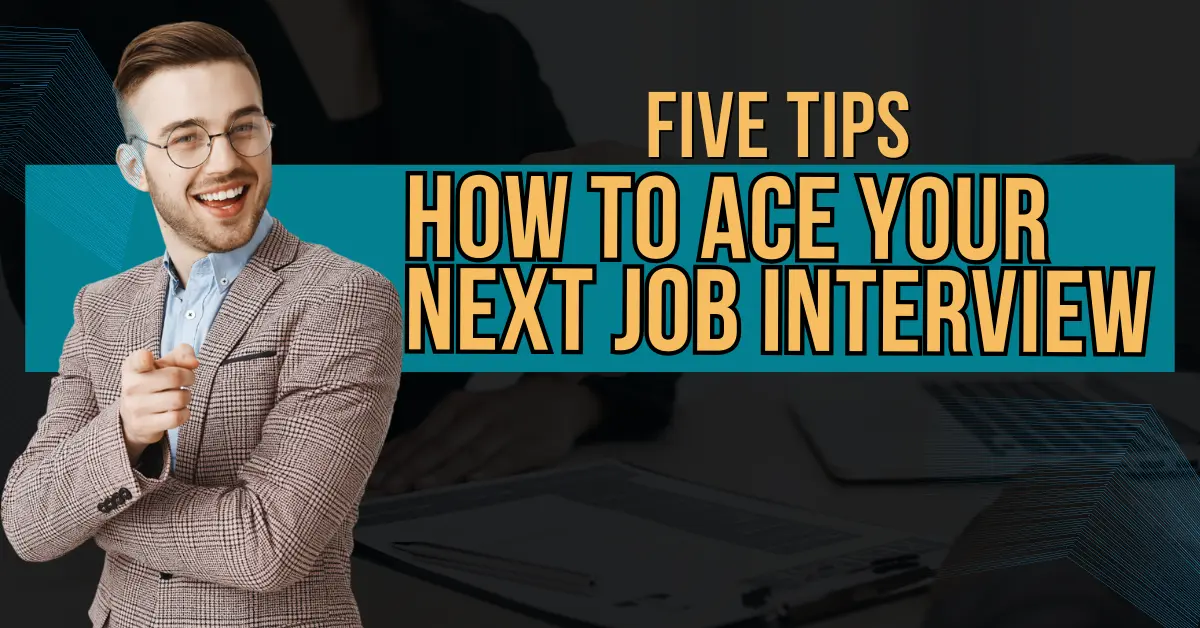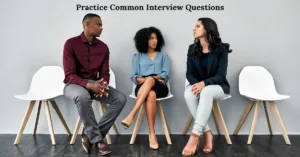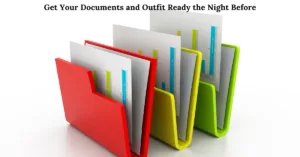
Job interviews can be stressful because they involve high stakes and the pressure to impress. You may worry about being judged and hope to make a good impression. To ace your next interview, prepare by researching the company and practicing common questions. Dress properly and arrive on time to show professionalism. During the interview, listen carefully, answer clearly, and express your enthusiasm for the role. Remember to ask questions to show your interest. Finally, stay calm and confident; it’s a chance to showcase your skills and personality. With practice and preparation, you can reduce stress and perform well.
How to Ace Your Next Job Interview: 5 Tips
Getting ready for a job interview can make anyone nervous. But don’t worry. We’ve put together five practical tips for how to ace your next job interview that will help you feel more confident and do your best when meeting your potential employer.
Do Your Research About the Company

Before you walk into that interview room, you need to know about the company you might work for. This doesn’t mean just reading the “About Us” page on their website (though that’s a good start!). Here’s what you should look into:
- Check their latest news and updates on LinkedIn and other social media
- Read current press releases or news reports about the company
- Look up their main products or services
- Find out who their biggest competitors are
- Learn about their company culture and values
Why is this important? When interviewers ask, “What do you understand about our corporation?” or “Why do you want to work here?” you’ll have smart, well-thought-out answers ready. This shows them you’re serious about the job and took time to prepare.
Pro tip: Write down 3-4 key facts about the company that grabbed your attention. You can bring these up naturally during your conversation with the interviewer.
Practice Common Interview Questions

While you can’t predict every question, some come up in almost every interview. Here are the most common ones you should prepare for:
- Tell me about yourself
- Why did you apply for this position?
- What are your strengths and weaknesses?
- Where do you see yourself in five years?
- Why should we hire you?
- What salary are you looking for?
The key to responding these queries well is to:
- Keep your explanations straightforward and to the point
- Use real examples from your past work or school
- Match your talents to what the job requirements
- Be honest – don’t make things up
- Practice your answers out loud
Pro tip: Record yourself answering these questions on your phone. Play it back to catch any “um’s” and “uh’s” or spots where you could improve.
Get Your Documents and Outfit Ready the Night Before

Nothing adds to interview stress like rushing around at the last minute! The evening before your interview:
Documents to prepare:
- Several copies of your resume (yes, paper copies still matter!)
- A list of references
- Your portfolio if needed
- Any certificates or diplomas mentioned in your resume
- A notepad and pen
- The interview address and contact person’s details
Clothing tips:
- Pick out your complete outfit
- Make sure everything is clean and ironed
- Choose comfortable but professional shoes
- Keep jewelry simple and minimal
- Have a backup outfit ready just in case
Pro tip: Put everything in a neat folder or portfolio case. This looks more professional than carrying loose papers.
Master Your Body Language and First Impression

The first few minutes of your interview count. Here’s how to make them work in your favor:
Arrival:
- Get there 10-15 minutes early
- Turn off your phone completely
- Be nice to everyone you meet – the receptionist might give feedback to the hiring manager!
- Take deep breaths to stay calm.
During the interview:
- Give a firm (but not crushing) handshake
- Make good eye contact
- Sit up straight but try to look relaxed
- Smile naturally
- Keep your hands visible and try not to fidget
- Nod occasionally to show you’re listening
Pro tip: If you’re nervous, remember the interviewer is just another person doing their job. They want to find the right person to help their team – they’re not trying to trick you or make you fail.
Ask Smart Questions and Follow Up

The end of the interview is your chance to shine by asking good questions. This shows you’re truly interested in the role and have thought things through.
Good questions to ask:
- What does a typical day look like in this role?
- What are the biggest challenges someone in this position faces?
- How would you measure success in this role after 6 months?
- What are the next steps in the hiring process?
- When can I expect to hear back about this position?
After the interview:
- Send a thank-you email within 24 hours
- Keep it short but mention something specific from your conversation
- Restate your interest in the position
- Double-check that your email has no spelling mistakes
Pro tip: Write down the interviewer’s name and one key point from your talk right after you leave. This makes your thank-you note more unique.
Final Thoughts
Remember, interviews are a two-way street. Yes, they’re checking if you’re right for the job, but you’re also checking if the job is right for you. Stay calm, be yourself (your professional self!), and trust in your preparation. The more interviews you do, the better you’ll get at them. Even if you don’t get this job, each interview is good practice for the next one. Take notes about what went well and what you could do better next time.
Just focus on being prepared, professional, and positive. With these five tips and some practice, you’ll be ready to make a great impression at your next job interview.
FAQs
Why are job interviews stressful?
Job interviews are stressful because they can determine your future job. You might feel pressure to impress the interviewer and worry about being judged, which can lead to anxiety before and during the interview.
How can I prepare for a job interview?
To prepare for a job interview, research the company and its values. Practice answering common questions, dress nicely, and plan your route. Being well-prepared can help reduce stress and boost your confidence.
What should I wear to an interview?
Wear professional and appropriate clothing to make a good impression. For most jobs, business casual or formal attire works well. Choose outfits that make you feel confident and comfortable during the interview.
How should I answer interview questions?
Answer interview questions clearly and confidently. Use examples from your past experiences to show your skills. Take your time to think before responding, and make sure your answers relate to the job you’re applying for.
What questions should I ask the interviewer?
You can ask about the company culture, job responsibilities, or growth opportunities. This shows your interest in the position and helps you understand if the job is a good fit for you.
Also Read:
How to Stay Motivated During Tough Times – 5 Tips
How to Cultivate a Growth Mindset: 5 Practical Ways
References:
https://en.wikipedia.org/wiki/Job_interview
https://en.wikipedia.org/wiki/Interview
https://www.researchgate.net/publication/309784998_How_to_prepare_for_an_interview
Disclaimer: This blog provides general information and tips for job interviews. The advice shared is for educational purposes only and may not guarantee success in every interview. Individual experiences may vary, and it’s important to tailor your approach based on your unique circumstances. Always seek professional guidance if needed.
Related post

7 Health Benefits of Assam Tea


